|
This section contains 987 words (approx. 4 pages at 300 words per page) |

|
Once the Allies decided the Germans should be tried rather than summarily judged, it became important to them to demonstrate that their trials, unlike those of the Nazis, assigned some rights to the accused. By scrupulously applying rules of evidence and creating a panel of judges determined to decide the defendants' fate on the basis of what was presented in open court, the Allies left open the possibility that some Nazis would go free, despite the overwhelming sense of their guilt. Thomas L. Karsten and James H. Mathias, two former members of the American prosecution team, believe this was one of the virtues of the trial. More importantly, these prosecutors attest that the outcome of the trial set important legal precedents that may deter future wars of aggression.
The judgment and verdict in...
|
This section contains 987 words (approx. 4 pages at 300 words per page) |

|




